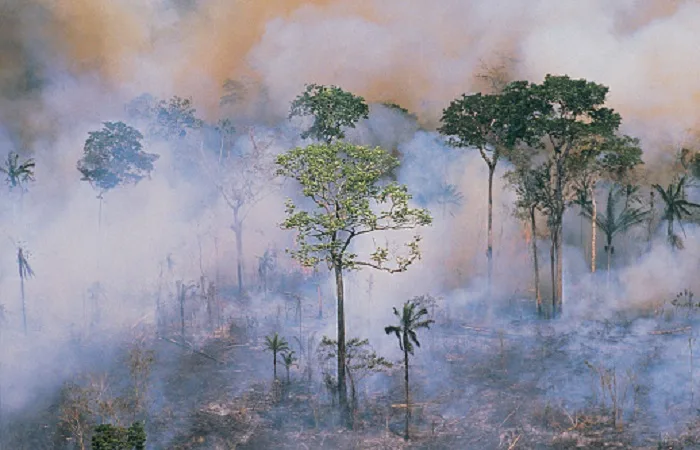
Canada pledges water bombers, $15M to fight Amazon wildfires
Prime Minister Justin Trudeau says Canada is offering to send water bombers and $15 million in aid to help Brazil and other South American countries fight the wildfires now ravaging the Amazon.
Trudeau made the announcement during the closing press conference of the G7 gathering in France this weekend.
"We could pretend that the situation in the Amazon is just part of a natural cycle, but that's not exactly what's going on here," he said.
"The toll of human activity and extreme weather events on our communities, our environment, our health and our world will continue to climb unless we take decisive action as part of our broader commitment to fight climate change."
The Canadian pledge is separate from another plan the G7 leaders agreed to this morning to tackle the Amazon wildfires and contribute to reforestation in the region. That plan includes providing $20 million US ($26.5 million Cdn) in emergency aid.
French President Emmanuel Macron put the Amazon wildfires on the G7 agenda at the last minute and announced the plan following a morning-long meeting with his counterparts, including officials from Canada.
According to Brazil's space agency, a record number of forest fires are burning in the country's Amazon region. Major wildfires are burning also in neighbouring Bolivia, Peru and Paraguay.
The funding agreed to in France will be used by countries to acquire firefighting planes, and the cash would be available "immediately," Macron said.
G7 nations also stand ready to provide military support.
"France will also offer concrete support with military in the region within the next few hours," Macron said in a news conference alongside Chilean President Sebastián Piñera, who played a key role in getting his four South American neighbours onside.
"They need, and with urgency, brigades specialized in fighting fires, specialized planes to fight those fires. That is the first stage that will be implemented immediately," said Piñera.
CANADA OFFERING ASSISTANCE
The second stage is more long term and will require the consent of the countries involved, he added.
It would involve a co-ordinated plan to not only reforest areas devastated by fire, but to guard the biodiversity of the region.
"It would, of course, always respect their sovereignty," Piñera said. "We think we have to protect these real lungs of our world."
The situation in the Amazon had come up at every one-on-one meeting held by Prime Minister Justin Trudeau with other world leaders.
Since 2013, Canada has seen an increase in the size and the intensity of its wildfires, particularly in the boreal forest.
There have been 644 forest fires in Alberta so far this year, burning up over 803,393 hectares by the end of June, according to provincial government figures.
NASA has characterized 2019 as an "extreme fire season."
Brazilian President Jair Bolsonaro continued to downplay his country's situation over the weekend, saying the country has wildfires every year.
The Brazilians have not yet accepted the Canadian offer, but are said to be "assessing their needs."
Climate change — specifically the loss of biodiversity — was already on the G7 agenda when this Amazon rainforest crisis gained prominence. Leaders spent Monday morning discussing it — although notably absent from that meeting was U.S. President Donald Trump.
TRUMP MISSING FROM MEETING
"The president has made his perspective on climate change very clear, made it very clear over the past years," said Trudeau.
"We believe that climate change is a real and existential threat to our planet."
Macron defended the president at the news conference, saying Trump had meetings with other world leaders at the same time and shared the general agreement on the need to fight the wildfires.
This article was written for the CBC by Murray Brewster.









